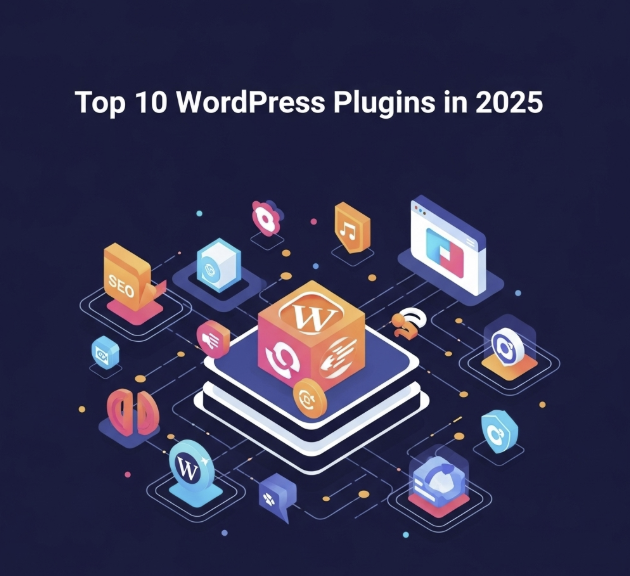
Introduction:
In 2025, WordPress continues to dominate the web development landscape, powering over 40% of all websites globally. Whether you’re running a personal blog, eCommerce store, or corporate website, plugins play a vital role in extending the functionality of your WordPress site.
1. Rank Math SEO
Purpose: SEO optimization
Why it’s Top in 2025:
Rank Math has become the gold standard in SEO plugins, giving Yoast a serious run for its money. It offers advanced on-page SEO, schema markup, keyword optimization, and Google Search Console integration, all in one sleek interface.
Key Features:
- AI-driven content analysis
- Rich snippet and schema integration
- 404 monitor and redirection
- Real-time SEO scoring
Best For: Bloggers, marketers, and businesses focused on organic search traffic.
2. WP Rocket
Purpose: Website performance and speed
Why it’s Top in 2025:
In a world where page load speed directly affects rankings and bounce rates, WP Rocket is essential. It’s a powerful caching plugin that optimizes load times with minimal configuration.
Key Features:
- Page and browser caching
- Lazy loading of images
- GZIP compression
- Database and CSS/JS minification
Best For: Any website looking to boost speed and Core Web Vitals.
3. Wordfence Security
Purpose: Security and firewall protection
Why it’s Top in 2025:
With increasing cyber threats and brute force attacks, website security is non-negotiable. Wordfence offers real-time threat defense and malware scanning to protect your WordPress site.
Key Features:
- Firewall with live traffic monitoring
- Malware scanner
- Login attempt limits
- Two-factor authentication
Best For: Businesses and bloggers who handle user data or run high-traffic sites.
4. WooCommerce
Purpose: eCommerce functionality
Why it’s Top in 2025:
Still the top choice for building online stores on WordPress, WooCommerce is incredibly flexible and supported by thousands of themes and plugins.
Key Features:
- Product, cart, and checkout pages
- Payment gateway integration
- Inventory and shipping tools
- Extensions for subscriptions, bookings, etc.
Best For: Small businesses, entrepreneurs, and online retailers.
5. FluentCRM
Purpose: Email marketing automation
Why it’s Top in 2025:
FluentCRM is an all-in-one CRM and email marketing solution built into your WordPress dashboard. In 2025, it will be widely adopted for its seamless automation workflows without requiring third-party platforms.
Key Features:
- Email sequences and campaigns
- Contact segmentation
- Tag-based automation
- Deep integration with WooCommerce and LearnDash
Best For: Creators, online coaches, and WooCommerce store owners.
6. Elementor Pro
Purpose: Page building and design
Why it’s Top in 2025:
With full-site editing becoming standard in WordPress, Elementor Pro still remains a favorite due to its drag-and-drop flexibility, stunning templates, and user-friendly interface.
Key Features:
- Visual drag-and-drop builder
- Theme builder (header, footer, etc.)
- Responsive editing
- WooCommerce widgets
Best For: Designers, freelancers, and agencies creating pixel-perfect pages.
7. WPForms
Purpose: Contact forms and lead generation
Why it’s Top in 2025:
WPForms is a beginner-friendly yet powerful form builder used by millions. From simple contact forms to complex surveys, it’s versatile and mobile-friendly.
Key Features:
- Drag-and-drop builder
- Conditional logic
- Payment integrations (PayPal, Stripe)
- Spam protection (reCAPTCHA, hCaptcha)
Best For: Website owners who need secure and customizable forms.
8. MonsterInsights
Purpose: Google Analytics integration
Why it’s Top in 2025:
Monster Insights makes it easy to understand how visitors interact with your site without touching code. It brings real-time Google Analytics data directly into your dashboard.
Key Features:
- eCommerce tracking
- Enhanced link and button tracking
- Real-time stats
- GDPR-compliant features
Best For: Marketers and business owners wanting actionable insights.
9. Advanced Custom Fields (ACF)
Purpose: Custom content and design
Why it’s Top in 2025:
ACF gives developers and power users more control over content. It lets you add custom fields to any post or page for tailored layouts and data structures.
Key Features:
- Flexible content layouts
- Repeater fields
- Easy API for theme integration
- Compatible with Gutenberg blocks
Best For: Developers building custom WordPress solutions.
10. WP-Sweep
Purpose: Database cleanup and optimization
Why it’s Top in 2025:
Over time, WordPress databases collect unnecessary data revisions, spam comments, and unused terms. WP-Sweep cleans all this up with a click, boosting performance.
Key Features:
- Deletes revisions, drafts, and orphaned data
- Optimizes database tables
- Clean, one-click interface
Best For: All WordPress users focused on keeping their site healthy and fast.
Conclusion:
The best plugins don’t just add features, they solve real problems. In 2025, the focus is on:
Speed and UX
Automation and AI
Security and compliance
Mobile responsiveness
Scalability
Whether you’re launching a blog, eCommerce store, or a full-scale digital platform, these plugins will enhance your WordPress experience and help you stay competitive in a fast-evolving online world.
Tip: Don’t overload your website with too many plugins. Choose what you need, keep everything updated, and test compatibility regularly
Frequently Asked Questions (FAQs)
There’s no fixed number, but it’s generally recommended to keep your plugin count between 15 to 20. What matters more is quality over quantity. Too many poorly coded plugins can slow down your site or create conflicts. Always test new plugins and keep only the ones that add real value.
Most plugins on the list offer free versions with core features, but their full potential is unlocked with Pro or premium plans. For example:
Rank Math SEO has a free version, but the Pro plan offers advanced schema and AI content tools.
Elementor Pro and WP Rocket are premium-only.
Not necessarily. The ideal plugin stack depends on your website’s purpose. For instance:
A blog may prioritize SEO, forms, and speed plugins.
An eCommerce site may need WooCommerce, security, and email marketing tools.
Use the plugins that align with your business goals and functionality needs.
Yes, excessive or poorly coded plugins can affect load time and site performance. That’s why it’s essential to:
Use lightweight, reputable plugins
Regularly audit and deactivate unused plugins
Optimize with tools like WP Rocket and WP-Sweep
Yes, most top-tier plugins in 2025, including Rank Math, Elementor, ACF, and WPForms: are either fully compatible with or enhance the Gutenberg editor. Some even offer custom blocks for seamless use.
To stay secure:
Install only from official sources (WordPress repository or verified developers).
Keep all plugins updated.
Use Wordfence Security or a similar plugin to monitor threats.
Delete deactivated or unused plugins to minimize vulnerabilities.
Yes! Rank Math offers a built-in import feature that allows you to migrate settings and data from plugins like Yoast SEO or All in One SEO with a few clicks, making the switch smooth and safe.
WP Rocket is considered the top plugin for improving site speed and Google PageSpeed Insights scores. Combine it with:
Smush or Imagify for image optimization
Asset CleanUp for removing unused CSS/JS
Yes. While Elementor is a separate page builder, you can use Gutenberg for basic posts and Elementor for advanced landing pages or product pages. Just ensure proper styling and compatibility across themes.
No coding knowledge is required for most plugins like:
WPForms (drag-and-drop form builder)
FluentCRM (visual automation flows)
Elementor (front-end visual builder)
However, for plugins like Advanced Custom Fields (ACF), basic coding can help unlock advanced features.
